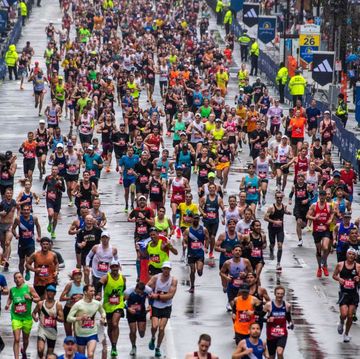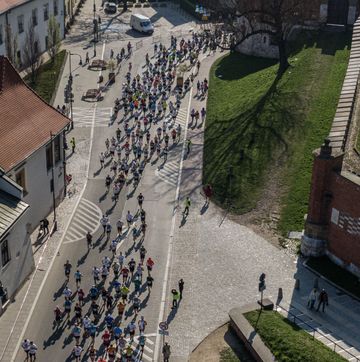It's critical for runners to keep track of how much protein is in their diets, but it's also important to eat it at the appropriate times to maximize performance benefits. Here's when to chow on this key nutrient for muscle recovery and become a stronger runner.
RISE AND SHINE, PROTEIN TIME
Start your day with protein to ensure you're properly fueling all that training. Sports performance nutritionist Krista Austin, who has a doctorate in exercise physiology and sports nutrition and has consulted with the Oregon Project, says that runners who front-load their day with more protein set themselves up for a more stable supply of energy, wind up feeling more satiated throughout the rest of the day, and enhance their moods. The goal is to keep pace with your energy demands, never letting your body go into a deficit.
Match your protein percentage intake to the type of training you have planned for the day. All of her recommendations are based on a 120-pound runner. On easy days, eat 35 percent protein, 45 percent carbs. (For a 500-calorie breakfast, get 43 grams of protein; scale for your recommended caloric intake.) On days when you're going hard or long, make it 25 percent protein and 60 percent carbs (31 grams of protein in a 500-calorie breakfast). Austin says that overall, runners need to increase their protein intake for breakfast on most training days.
Suggestions:
- Four-egg omelet with spinach and tomato, two soy sausage links, and fruit = 520 calories/34 grams protein
- Protein Pancakes (1 serving, adding 25 grams protein powder to the mix) and two-egg omelet with spinach and tomato = 540 calories/44 grams protein
THE POST-WORKOUT RECOVERY WINDOW
Protein is imperative for muscle repair and growth. Runners need to time protein intake to hit the 30-minute post-workout recovery window. Austin recommends that this meal or snack contain 25–30 grams of protein. Scale proportionately to your weight.
Chris Winter, a Canadian steeplechaser at the 2013 world track championships, is a big fan of fish for go-to recovery. "I'll spend the few bucks extra to get that little better cut of meat or piece of fish," he says. "I find that in doing so I stay healthier, leaner, and generally have more energy. A plate of fresh salmon, quinoa, and a salad is my idea of a perfect recovery meal."
Suggestions:
- Apple and 1 cup low-fat cottage cheese = 280 calories/25 grams protein
- Tuna melt: 3 ounces tuna, 1 ounce cheese, one English muffin = 340 calories/27 grams protein
DAIRY PROTEIN BEFORE BED
Contrary to conventional wisdom, eating before bed will not add unwanted pounds. While some studies have linked weight gain and late-night eating patterns, an extensive review by the British Medical Journal showed that this correlation only exists if you are eating too much or making poor food choices. In fact, eating a protein-stocked snack before hitting the pillow will do your training a favor--it's a bonus recovery window to stimulate muscle repair and growth. A 120-pound runner should ingest 20–25 grams of protein, and to increase the benefits of this window, opt for a dairy source: The special enzymes from dairy enhance the benefits of this nightly protein. Skim chocolate milk, the ever-popular recovery drink, mixed with some protein powder, is the perfect combination of dairy, protein and sugar to aid restoration. Drink it right before going to bed to make tomorrow's workout more productive.
Suggestions:
- 16 ounces skim chocolate milk = 200 calories/16 grams protein
- Add protein powder of choice = 10 grams protein












